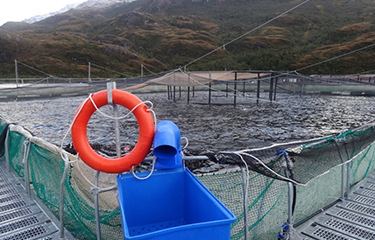Australis accused by Chile's environmental watchdog of exceeding permitted production limits

Chile’s Superintendency of the Environment (Superintendencia del Medio Ambiente, or SMA) has initiated a new sanctioning procedure against salmon farmer Santiago, Chile-based Australis Mar for overproduction.
The new sanction procedure is against Australis’s 20-hectare Estero Retroceso grow-out center in Chile’s Magallanes Region, in the southern part of the country. The new procdure is the sixth case that SMA has opened against the company, and the fourth concerning overproduction.
The SMA reported that it received a complaint from Chile’s National Fisheries and Aquaculture Service (Sernapesca), which found that during the company’s 2018 to 2019 production cycle raw material processed at its Estero Retroceso center reached 7,459 metric tons (MT), with accumulated mortality in the productive cycle of 80,374 fish, representing an additional 160.5 MT of biomass. As such, total production at the center allegedly amounted to 7,620 MT, far exceeding the maximum authorized production of 4,320 MT.
“The overproduction of salmon is one of the infractions that most concern us, because of the environmental effects they cause. In the cases we have brought up, these are no marginal increases, but large amounts of overproduction,” acting SMA head, Emanuel Ibarra, said in a release. “This is a breach that should never occur in these dimensions, because companies should have total control of their production cycle.”
Australis said it plans to continue cooperating with the authorities on the investigation.
“The company maintains its commitment to collaborate with the authority in the review of this case, which corresponds to a production cycle started more than four years ago, specifically in January 2018. This is in line with the company's actions under the industry’s first voluntary compliance pilot program in conjunction with the SMA,” Australis said in a statement sent to SeafoodSource. “It should be noted that all the information on the production cycle in question has been reported to the regulatory entities, in a fully transparent and timely manner.”
The Estero Retroceso center is located inside the Kawésqar National Reserve – an area that has been at the center of national attention, including a documentary produced by National Geographic that called for the reserve to be declared a national partk – effectively halting salmon production in the area.
The latest procedure isn't the first instance of Australis having sanctioning procedures for overproduction related to facilities inside the reserve. In May, SMA initiated a sanctioning process against Australis for overproduction at the Morgan salmonid grow-out center, also located within Kawésqar National Reserve. Since the reserve is considered a protected wild area, the infractions against the environmental permit are considered serious.
Earlier this month, SMA also filed charges against salmon farmer Cermaq Chile, which it said overproduced more than 782 MT per year between May 2017 and June 2019 at the Estero Navarro salmonid grow-out center, also located in the Kawésqar National Reserve.
While SMA did not specifically mention it this time, it previously reported that if found guilty, errant salmon farmers risk revocation of their environmental permit, closure of operations, or fines of an amount equivalent to up to CLP 3.3 billion (USD 3.7 million, EUR 3.5 million).
Besides the charge of overproduction, SMA also said that Estero Retroceso exceeded maximum parameters of total suspended solids and fecal coliforms in effluents from its wastewater treatment plant. That is considered a lesser offense, which according to past reports carries a maximum possible fine of CLP 666 million (USD 806,000, EUR 754,000).
SMA has a total of five other sanctioning processes ongoing against Australis Mar: one for a farm in the Biobío Region, two for grow-out centers in the Aysén Region (Salas 5 and Costa), and two in the Magallanes Region (Córdova 3 and Morgan) – both of which are located within the Kawésqar National Reserve. The new case in Estero Retroceso join cases of overproduction at the centers Córdova 3, Morganm, and Costa.
In the case of the Morgan grow-out center, Australis recognized its fault, and admitted that it had also overproduced during the 2019-2021 cycle. In response, it said it would lower production by a total of 1,816 metric tons (MT) in its next production cycles. The company said that the cut in future cycles, together with other actions of its proposed compliance program, will represent a cost of CLP 2.99 billion (USD 3.62 million, EUR 3.38 million).
Photo courtesy of Chile’s Superintendency of the Environment (Superintendencia del Medio Ambiente)






Share